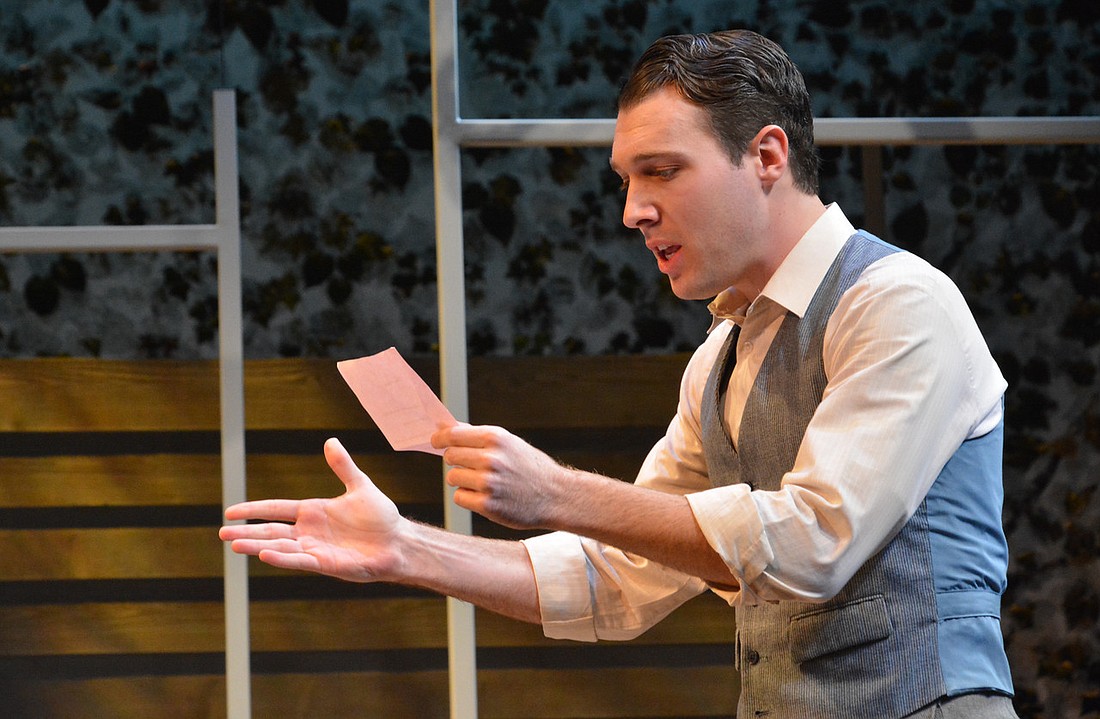- April 23, 2024
-
-
Loading

Loading

If the Tyrone family of “A Long Day’s Journey into Night” is a dark reflection of Eugene O’Neill’s real family, the Millers of “Ah, Wilderness!” are a sunny dream of the family he wished he had. That dream takes center stage in an Asolo Rep production of O’Neill’s uncharacteristically comic and warm-hearted play.
We meet the Millers in New London, Connecticut, on a cloudless Fourth of July in 1906. They’re a middle-class family with middle-class hopes, dreams and fears. Petite bourgeoisie, as one of those socialist rabble rousers might say.
17-year-old Richard (Tom Harney) is a budding rebel who’s stuffed his bedroom bookshelf with subversive plays and prurient poetry. (We’re talking Wilde, Shaw, Ibsen and Omar Khayyam.) Tame stuff by today’s standards, but it gets him in trouble. His girlfriend’s father (William Dick) intercepts Richard’s love letters, reads his quoted poetry, and forces Muriel (Lilianna Solum) to break off the relationship. Heartbroken Richard accepts the invitation of his brother’s Yalie roommate (Kevin Barber) to join him on a double date. But that’s really a cover story. The two wind up consorting with “women of low reputation” instead. Back on the home front, his father’s sister and mother’s brother are a loving couple—almost, but not quite. Uncle Sid (Douglas Jones) alternates between drunken hilarity and crestfallen apology. Aunt Lily (Peggy Roeder) still carries a torch for Sid, but won’t marry the man because of his drinking. But Richard’s father and mother (David Breitbarth and Denise Cormier) are still very much in love.
While Richard’s the main character, he’s surrounded by a host of other characters. Interesting people. Minor or major, they all come to life.
Harney is dead serious—and dead funny—as the gangly, speechifying Richard. (The young Conservatory actor reminds me of Paul Rubens’ performance in “Life with Father” in my own nostalgic past.) Great physical comedy when he resists a smooch from a prostitute or takes about ten minutes to kiss his true love, Muriel (Solum)—who’s a fine young actor as well. (The two are magical in their secret meeting under the light of a giant, rear-projected moon.) Breitbarth is dryly funny as Richard’s father, Nat, the no-nonsense newspaperman—a reasonable man who occasionally explodes at unreasonable people, but only after a long, slow burn. His mother Essie (Cormier) is a tad overprotective but not a slave to convention. Richard’s eleven-year-old brother, Tommy (Ryan Modjeski), lives to detonate fireworks; his sister Mildred, (Kelsey Petersen), takes pleasure in perfecting her signature and tormenting her brothers; his older brother, Arthur (Joe Knispel), enjoys being the older brother. Douglas Jones is hilariously puckish as Uncle Sid—a funny drunk and not a mean drunk. And the drunker he gets, the funnier he gets. (His family fights not to laugh. They don’t want to encourage him.) Roeder nicely evokes Aunt Lily’s wasted years. Lisa Egan Woods aptly captures Belle’s coarse character. The Millers are nice folks. She reminds you of the harsh realities (and people) around them.
So how do you approach this material? Cloying nostalgia? An echo of O’Neill’s darker plays?
Director Greg Leaming takes a couple of post-modern steps away from realism. His stylized touches remind us this is the re-imagined past, not the remembered past. Leaming also keeps things moving—cutting about 45 minutes (with permission from O’Neill’s estate) from the loquacious playwright’s 160 minutes original. This includes interludes of popular period songs (including “Love’s Sweet Song” and “I Don’t Care”) arranged by Darren Server and accompanied by Evan Reynolds White on a tinny upright piano.
Steve Kemp’s dreamy set only suggests the happy home with flyaway frameworks. Tracy Dorman’s costume designs remind us that this was not the age of t-shirts and shorts; the Millers wear suits and gowns when they go to the beach.
It’s entertaining stuff—largely thanks to the reward pellet of nostalgia. But O’Neill’s comedy is also part of the fun. His mordant wit runs through all his plays—although it’s easy to overlook, with all the murders, suicides, wasted lives, addiction and despair. Here, the jokes are plain to see. Along with interesting characters who, surprisingly, aren’t doomed.
They’re ordinary people in a simpler time. At first glance, the play feels like O’Neill’s doing a Clarence Day imitation. Dig deeper and you’ll find politics and problems. Uncle Sid’s boozing ruined his own chances at love and Aunt Lily’s as well. Richard’s budding socialism bloomed to full flower in the adult O’Neill. But something else is at play.
Satirists and social critics make a living by tearing things down. Human monsters are easy (and a lot more fun) to write. Building up is harder. Creating good people is much, much harder.
And I think that’s what O’Neill deliberately did.
With the exception of Belle, most of the characters have good manners. They may criticize, but they never bully, belittle or attack. Their dialog is filled with talk of manners, feelings and consideration. There’s an implied morality behind their manners; a concern for human feelings. Looking good isn’t enough. These people want to be good. And it seems to me they are.
That’s a far cry from O’Neill’s real family. But his alternative reality family is not so implausible. The Millers have problems, but they’re kind to each other.
For once in the playwright’s life, he imagined that it was possible.